 European Law and National Private Law
European Law and National Private Law Book contents
- Frontmatter
- Preface
- Contents
- Table of Cases
- Table of Legislation
- List of Abbreviations
- Part I Sources of European Law and Their Influence on National Private Law
- Part II Overview of Directives and Scholarly Projects in General Private Law
- Chapter 7 A Summary of the Private Law Directives
- Chapter 8 An Overview of the ‘Principles’ and Other Academic Projects
- Bibliography
- Index
Chapter 8 - An Overview of the ‘Principles’ and Other Academic Projects
from Part II - Overview of Directives and Scholarly Projects in General Private Law
Published online by Cambridge University Press: 22 September 2018
- Frontmatter
- Preface
- Contents
- Table of Cases
- Table of Legislation
- List of Abbreviations
- Part I Sources of European Law and Their Influence on National Private Law
- Part II Overview of Directives and Scholarly Projects in General Private Law
- Chapter 7 A Summary of the Private Law Directives
- Chapter 8 An Overview of the ‘Principles’ and Other Academic Projects
- Bibliography
- Index
Summary
INTRODUCTION
JURISPRUDENCE AND A EUROPEAN CIVIL CODE
Since 1980 European scholars of civil and comparative law have been working on laying the foundations of a European Civil Code, or at any rate a European Code of Contract Law.
In 1989 the European Parliament called for the first time on the Commission to start work on drafting a common private law code. The Parliament stated that the harmonisation of certain sectors of private law was vital to the completion of the internal market and that the unification of large parts of private law in the form of a European private law code was the most effective harmonisation method for meeting the legal needs of the Union within a large frontier-free market. The repeated resolutions eventually resulted in an initiative of the Commission, which mentions the various academic projects aimed at the objective proposed by the Parliament, the most important being the Principles of European Contract Law; work on this project had started around 1980 and the first version was published in 1995. A European code in any form is indeed not conceivable without extensive preliminary academic work. In the following I will briefly discuss the various academic activities carried out in Europe, partly in response to resolutions of the Parliament.
ACADEMIC PREPARATION
A first precondition for the development of a European private law is the existence of academic literature describing trends and elements that are common to the various major European legal systems, including their legal history backgrounds. An impressive representative of the ‘ius commune’ approach based on legal history is Reinhard Zimmermann's monumental The Law of Obligations. Roman Foundations of the Civilian Tradition (1990), which, taking Roman law as the starting point, describes the development of Roman legal institutions in modern legal systems.
Among the literature which directly addresses current law, three standard works are particularly worth mentioning: Hein Kötz, Europäisches Vertragsrecht (2. Auflage, 2015); Christian von Bar, Gemeineuropäisches Deliktsrecht, Band I and II (1996 and 1999) (The Common European Law of Torts, Vols. I and II, 1998 and 2000); and Peter Schlechtriem, Restitution und Bereicherungsrecht, Band I and II (2000 and 2001).
- Type
- Chapter
- Information
- European Law and National Private LawEffect of EU Law and European Human Rights Law on Legal Relationships between Individuals, pp. 267 - 280Publisher: IntersentiaPrint publication year: 2016


